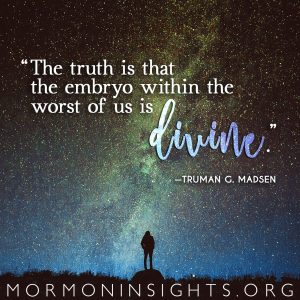If we could see each person’s divine potential, how would we act? How would we treat others—and ourselves—differently?
Sometimes, we feel like terrible people. We think, “Why did I mess that up again?” or “Why couldn’t I do this better?” We become our harshest critics, judging ourselves without realizing how far we’ve come or how far we can still go. We struggle to understand our divine potential and our identities as children of God. Truman G. Madsen discusses how to uncover and recover our divinity in his address “The Highest in Us.”
Brother Madsen explains that we can all become like God because of our divine heritage as his sons and daughters. As Brother Madsen notes, “The truth is that the embryo within the worst of us is divine. . . . The potential is there.”
If we all have divinity within us, we shouldn’t judge each other or ourselves as unworthy of love and greatness. Brother Madsen asserts that if we were to realize who we are and what we did to get here, we “would never again yield to any of the putdowns . . . in our culture today.” We also wouldn’t yield to any of the putdowns that we direct toward ourselves.
When we recognize our divinity, how will we act differently? According to Brother Madsen, we will serve others more earnestly, realize that we are worthy of direct and candid communication with our Heavenly Father, and feel greater peace in our lives.
We all have the potential to become gods—to become the best versions of ourselves. Let’s start recognizing the divinity within us now.
For more on our divinity, read Truman G. Madsen’s talk “The Highest in Us.”
Source: BYU Speeches
—Kjersten Johnson, Mormon Insights
feature image by stefan stefancik
Find more insights
Want to know more about what it means to become gods and goddesses? Read the LDS.org entry “Becoming Like God.”
To find out how to become more like God, watch Elder Daniel L. Johnson’s October 2012 general conference address “Becoming a True Disciple.”
For further discussion on the nature of divinity, read Elder Jeffrey R. Holland’s October 2003 address “The Grandeur of God,” which discusses the character of God.



